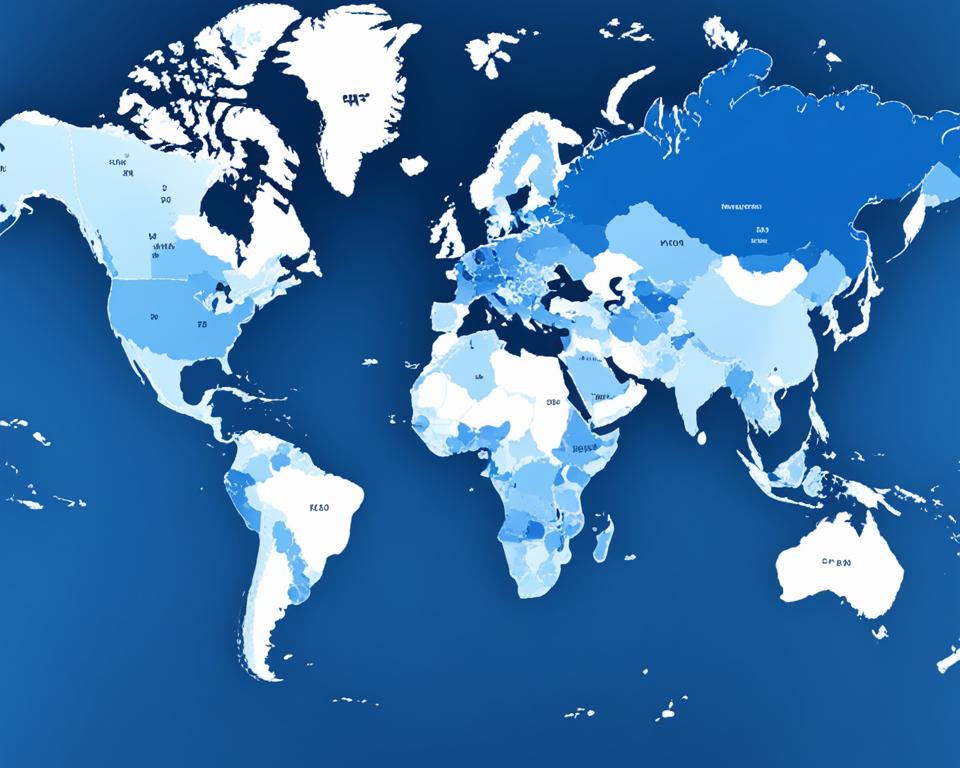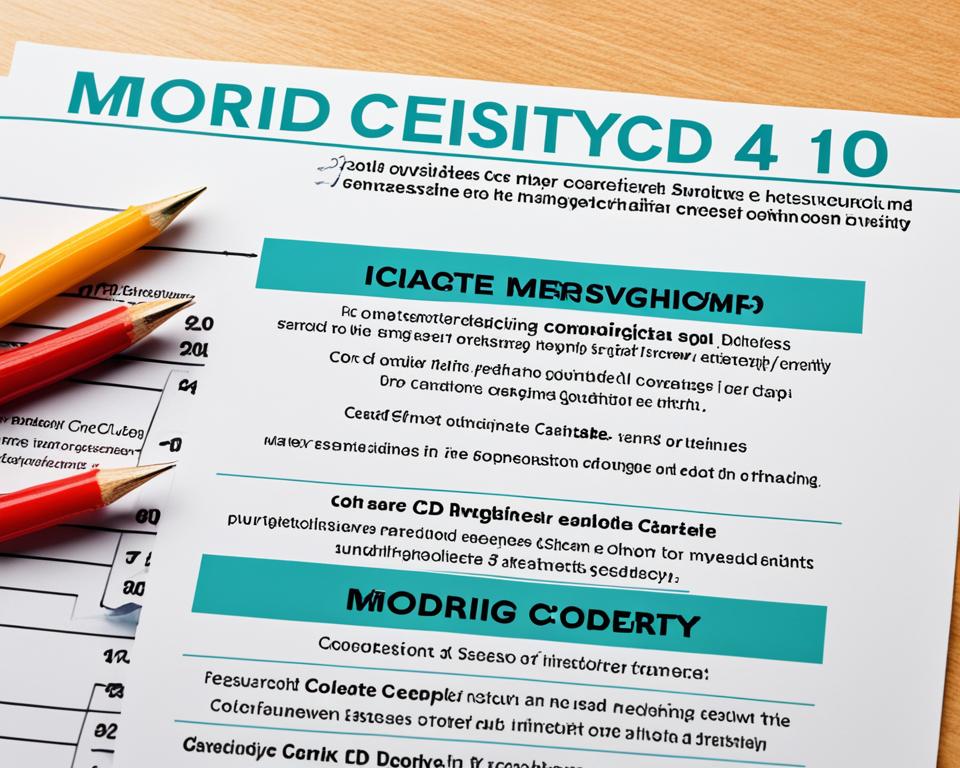
ICD 10 Morbid Obesity is a major issue under ICD 10. It affects many people around the world. This article explores this condition, its diagnosis, and how to handle it.
It’s not only a physical health problem. It also impacts mental health and the joy of living. Understanding its broad effects is crucial in stopping its spread. We aim to understand ICD 10 for morbid obesity and find ways to manage it.
Table of Contents
ToggleKey Takeaways
- Morbid obesity is a serious medical condition classified under the ICD 10 coding system.
- Understanding the diagnostic criteria and BMI thresholds for morbid obesity is crucial for accurate diagnosis and treatment planning.
- Morbid obesity is linked to various comorbidities, including metabolic disorders and chronic conditions, which must be addressed holistically.
- Comprehensive weight management strategies, such as lifestyle modifications, nutrition counseling, and bariatric surgery options, can help individuals with morbid obesity achieve sustainable weight loss and improved health outcomes.
- A multidisciplinary approach to care, involving collaborative healthcare teams and patient education, is essential for effective management of morbid obesity.
Unveiling Morbid Obesity: ICD 10 Classification
In the world of healthcare, morbid obesity is a point of focus. It’s known for being a serious type of obesity.
The International Classification of Diseases (ICD) 10, it gets a special place. This system is vital for doctors, insurance workers, and researchers. They use it to correctly spot, record, and deal with this health challenge.
What is Morbid Obesity ICD 10?
Morbid obesity ICD 10 is a type of classification system. It’s used to label and sort cases of morbid obesity. People with morbid obesity have a very high body mass index (BMI).
Such a condition brings along major health threats. With this system, healthcare workers can pinpoint and record morbid obesity cases. They can do this with precision. This helps ensure the right care is given and helps keep an eye on how widespread this issue is among the population.
Breaking Down the Code: ICD 10-CM E66.01
Within the ICD 10-CM system, morbid obesity has a unique code: E66.01. This code, made up of numbers and letters, is a common language. It helps in clear communication. This is crucial for proper medical notes, billing, and research.
By knowing the E66.01 code, medical experts can better manage morbid obesity cases. This knowledge is key to improving how we handle patients and public health policies.
The Global Burden of Morbid Obesity
Morbid obesity is becoming a big issue worldwide. It’s not just about health problems. It also affects how people feel mentally and their general happiness. It’s important to understand the problem to stop it from getting worse and help those affected.
Today, more people than ever suffer from morbid obesity. In the U.S., over 9% of adults are morbidly obese. This number impacts some groups more than others, like those with fewer resources. Tackling this issue requires looking at why it’s happening and the related health problems.
Morbid obesity doesn’t just harm the body. It takes a toll on mental health and how people feel about themselves. Those affected often deal with harsh judgment and have trouble getting health treatment. The lack of support can lead to more health issues and harder lives.
We can fight morbid obesity by helping people eat better and live healthier. It’s about more than losing weight. We’re also making sure people have the right support. With everyone’s effort, we can make a difference in many lives.

Navigating the Challenges of icd 10 morbid obesity
People diagnosed with ICD 10 morbid obesity often struggle with many issues. They can face judgement from society and might find it hard to access care. It’s important for doctors, leaders, and communities to come together to help.
Morbid obesity can bring a lot of hurtful assumptions and discrimination. This may cause low self-esteem and make it tough to get the care they need. By educating the public and running campaigns, we can fight this stigma. Then, everyone can feel more accepted and supported.
Getting the right healthcare, like weight loss surgery, might be hard for those with obesity classification and BMI criteria that fit ICD 10 morbid obesity. We need changes in healthcare, better insurance, and more clinics that understand the needs of these patients.
It takes a team effort to help people with ICD 10 morbid obesity well. Doctors, nutritionists, and mental health professionals work together. They create plans that fit each person’s needs, including nutrition counseling and weight management programs.
We must tackle the issues that stop people with ICD 10 morbid obesity from getting help. This way, they can have a fair chance to reach their health goals and feel better.
Identifying Risk Factors and Commorbidities
Morbid obesity falls under the ICD 10 system and comes with many other health risks. It’s important for doctors to know these risks. This helps them make the best treatment plans and deal with the many parts of this health problem.
Metabolic Disorders and Chronic Conditions
People with ICD 10 morbid obesity face a higher chance of getting metabolic disorders. These include type 2 diabetes, high blood pressure, and unhealthy cholesterol levels. These health problems can make the situation even harder. But treatments like weight loss surgery and bariatric procedures can help improve health.
Psychological and Social Implications
Morbid obesity doesn’t just affect the body. It also has a big impact on the mind and social life. People with ICD 10 morbid obesity might feel judged, left out, or lonely.
This can make them feel sad or worried. These extra problems can make changing their diet and lifestyle harder. It’s really important to support their emotional and social needs for their health and long-term weight goals.
Diagnostic Criteria and BMI Thresholds
Diagnosing morbid obesity correctly is key for applying the right medical help. It starts with knowing the diagnostic rules and BMI levels for morbid obesity under ICD 10.
Understanding BMI Classifications
BMI helps show if someone’s weight is healthy. The WHO set these categories based on BMI:
- Underweight: BMI less than 18.5
- Normal weight: BMI between 18.5 and 24.9
- Overweight: BMI between 25.0 and 29.9
- Obesity: BMI of 30.0 or higher
- Morbid obesity: BMI of 40.0 or higher, or BMI of 35.0 or higher with major health problems
ICD 10 Morbid Obesity BMI Cutoffs
The ICD 10 categorizes morbid obesity using specific BMI points. The important BMI levels for ICD 10 morbid obesity are:
| ICD 10 Code | BMI Criteria |
|---|---|
| E66.01 | BMI of 40.0 or higher |
| E66.02 | BMI of 35.0 or higher with major health problems |
Knowing these rules and BMI levels is crucial for doctors and nurses. It helps them spot, define, and treat morbid obesity. This leads to better care and results for patients.

Weight Management Strategies
Tackling morbid obesity means using many strategies. People with this condition can try lifestyle changes, getting nutrition help, using medicine, and sometimes having surgery.
Lifestyle Modifications and Nutrition Counseling
Starting with changing how you live can help a lot. This means doing regular exercises that help you burn calories and get stronger. Also, talking to a nutrition expert can teach you how to eat healthy, control your food amounts, and have a good diet. Changing your life this way can be a big help in losing weight and getting healthier.
Pharmacological Interventions
Sometimes doctors may suggest using certain medicines to help lose weight. These are medicines approved by the FDA for this purpose. When you use them along with lifestyle changes, they can really work to help you lose weight and become healthier.
Bariatric Surgery Options
If lifestyle changes and medicine haven’t worked enough, surgery might be an option. There are a few types, like gastric bypass and sleeve gastrectomy.
These surgeries change how your body processes food to help you eat less and lose weight. Studies show that bariatric surgery can lead to long-lasting weight loss and help with health problems like type 2 diabetes and sleep apnea.

Usually, the best way to tackle morbid obesity is to combine these different methods. By working with your healthcare team, you can come up with a plan that fits your needs. This personalized approach can lead to lasting weight loss and better health.
Obesity Classification: ICD 10 Codes
The International Classification of Diseases, 10th Revision (ICD-10) helps doctors classify and note various health issues, like morbid obesity. It identifies two codes specific to those facing extreme obesity:
ICD 10 Morbid Obesity Unspecified
ICD 10-CM E66.01 is for cases of morbid obesity with no clear cause. Doctors use it when they can’t pinpoint why a person has morbid obesity. This might be due to many things like genes, surroundings, and lifestyle choices.
ICD 10 Morbid Obesity Due to Excess Calories
If someone’s morbid obesity stems from eating too many calories, they get the code ICD 10-CM E66.09. It fits those who became obese by eating a lot and not moving much for a long time.

It’s really important for doctors to use the right ICD-10 codes for morbid obesity. This helps with accurate health records, getting paid right, and doing research to find better ways to handle morbid obesity. The right code opens the door to good weight management programs and support for patients.
Multidisciplinary Approach to Care
Managing
ICD10 Morbid Obesity
and
Obesity classification
needs a team effort. Different health experts work together. They help those with
Morbid obesity
meet their
Weight Loss
and
Weight Management
targets.
Collaborative Care Teams
The care team for
Morbid Obesity
includes various professionals:
- Primary care physicians
- Bariatric surgeons
- Registered dietitians
- Mental health professionals
- Exercise Specialist
They look at the patient’s unique challenges. This ranges from
Metabolic Disorders
to
Commorbidities
and
Lifestyle Changes
Patient Education and Support
Learning and support are key in
Weight Management Programs
. Healthcare experts should:
- Talk about what ICD 10 morbid obesity means for the patient
- Inform about bariatric procedures and weight loss surgery
- Give advice on diet and life changes
- Help with mental and social issues of
- Make sure patients know where to find help
This makes a strong, helpful group. They make it easier for people to handle
Public Health Initiatives and Policies
To tackle the issue of ICD 10 morbid obesity, many steps are needed at the public health level. We must work on initiatives and policies that raise awareness, prevent it, make services available, and include everyone. These steps are key in addressing this health problem.
Promoting Awareness and Prevention
We need public health campaigns to teach people about obesity classification and why keeping a healthy BMI criteria is important. This helps fight discrimination against ICD 10 morbid obesity.
If people know more about what causes this problem and its other health issues, they are more likely to take steps to prevent it. This includes joining weight management programs and making changes to how they live.
Accessibility and Inclusivity
Everyone should have access to help, especially when it comes to morbid obesity. This means making things like weight loss surgery and bariatric procedures easier to get for those who need it.
It also means offering nutrition counseling and programs for lifestyle changes. They should be tailored to fit the needs of people with metabolic disorders and other health issues.
A healthcare system that genuinely cares and includes everyone helps people manage their weight better.
Emerging Treatments and Research
Managing morbid obesity is changing fast thanks to new studies and treatments. This progress can make life better for those with this big health issue.
Novel Therapies and Clinical Trials
Doctors and researchers are looking for new ways to help with morbid obesity. They are trying out new medicines and surgeries. The goal is to tackle the health problems that come with being very obese.
Recently, there have been more surgical options, like those that are less invasive or focus on fixing how your body handles food. These new surgeries are helping more people get to a healthier weight.
In addition, there are research studies that look at how better diet and lifestyle changes can help. These studies want to find ways to help people manage their weight in the long term. They focus on the body, mind, and social life of the person.
Advancing Obesity Management
We’re learning more and more about morbid obesity, and experts are working hard to find better treatments. They hope to improve health, reduce extra health problems, and make life better for those with morbid obesity.
Health experts, policymakers, and the public are teaming up to fight obesity better in the future. Using new science and tools, they aim to provide better care for those dealing with extreme obesity.
Conclusion
Understanding ICD 10 morbid obesity is vital for many people. This includes healthcare workers, policymakers, and those dealing with the condition.
You can use the insights from this article to improve how you prevent, diagnose, and manage morbid obesity. This will help make people healthier and happier.
We explored obesity classification and BMI criteria. We also looked at different ways to manage weight. These include lifestyle changes, nutrition advice, medications, and surgeries. This knowledge is key for healthcare teams. They can offer the best care for their patients. It’s not just about the body. It’s also about how obesity affects the mind and social life.
This article also shows how important it is to have public health programs. These programs need to focus on awareness, prevention, and making help available to everyone. By working together and using new treatments, we can tackle morbid obesity better. This will lead to better results for those fighting this health issue.
Looking ahead, we must join forces to fight ICD 10 morbid obesity challenges. Putting our heads together will help people make lasting changes. It will also boost the health and happiness of everyone dealing with this condition.
FAQ
What is morbid obesity ICD 10?
Morbid obesity, part of the ICD 10, is a severe type of obesity. It comes with big health risks and difficult challenges.
What is the specific ICD 10 code for morbid obesity?
The specific ICD 10-CM code is E66.01. This code is for morbid obesity in the Clinical Modification system.
What is the global prevalence and impact of morbid obesity?
Morbid obesity is becoming a serious health issue worldwide. It greatly affects physical and mental health, and quality of life.
What are the challenges faced by individuals with morbid obesity?
People with morbid obesity face disapproving looks from society. They also encounter issues finding suitable care and managing the health problems it brings.
What are the risk factors and comorbidities associated with morbid obesity?
There are many risk factors like metabolic disorders that come with morbid obesity. Addressing these is vital for patient care.
How is morbid obesity diagnosed based on BMI criteria?
Diagnosing morbid obesity involves BMI measurements. Knowing BMI categories and cutoffs is key for correct diagnosis and planning treatments.
What weight management strategies are available for individuals with morbid obesity?
There are several strategies for managing weight in morbidly obese individuals. These include changing lifestyles, dietary advice, using medications, and surgery.
What are the different ICD 10 codes for morbid obesity?
Several ICD 10 codes exist for different types of morbid obesity. Knowing these codes is important for medical records and research.
What is a multidisciplinary approach used in the management of morbid obesity?
Managing morbid obesity well means using a team approach. This includes medical help, education, and support from various experts.
What public health initiatives and policies are aimed at addressing morbid obesity?
Solving morbid obesity demands efforts at a public level. We need initiatives to inform, prevent, and offer better care to everyone.
What are the emerging treatments and research in the field of morbid obesity management?
New treatments and research are constantly growing in the fight against morbid obesity. These new options aim to better life quality for those affected.
